One Month Later, Pope Still Pertinent
TNS
Pope Francis arrives at St. Patrick’s Cathedral in Manhattan to an enthusiastic crowd on Thursday, Sept. 24, 2015. (Carolyn Cole/Los Angeles Times/TNS)
November 9, 2015
Father Leo J. O’Donovan, S.J., sat in his office on W. 66th St. one September afternoon when his phone rang. On the other line was none other than the office of Joe Biden, the Vice President of the United States, with an invitation to join them at the welcoming ceremony for Pope Francis on the White House lawn the following week. Fr. O’Donovan, in true Jesuit fashion, politely denied the invitation because the ceremony was taking place on a Wednesday, when he teaches his vision and faith class at FCLC.
He was, thankfully, able to change his mind and attended both the ceremony at the White House on Sept. 25 and the pope’s address to Congress on Sept. 26. The Observer had the opportunity to speak with Fr. O’Donovan about his experience and what lessons can be taken from the papal happenings in D.C.
Francis’s visit, according to O’Donovan, worked first and foremost to “awaken Americans to issues important for not just the United States, but all of humanity.” He addressed many of the same subjects in some form or another at every stop along his path – which included climate change, immigration, care for the poor and freedom of religion – yet always had his audience in mind, emphasizing different issues for different audiences.
What Fr. O’Donovan seemed to admire most about the pope was his subtlety and use of discretion in his remarks. The beautiful thing about Pope Francis, he said, is that “his approach is to talk about what you can talk about constructively and not scold or enter into a debate that, in general, is going to be fruitless.”
This is certainly a lesson that Americans, in general, could stand to learn. Disagreement is inevitable, but the way we handle said disagreement is entirely within our control. Francis has shown by example that not every conversation concerning a delicate subject needs to be fueled by anger and end in resentment.
In his address to Congress, for example, the pope mentioned the sanctity of life, a topic which has weighed heavily on the American consciousness for decades. Many know the Catholic Church’s stance on this issue, but Francis did not enumerate on it because he did not need to; it is something of which people are already aware. He instead took the opportunity to make a plea for something less divisive yet equally important: the end of capital punishment.
Pope Francis closed his address to Congress poignantly, by remembering four great Americans: Abraham Lincoln as a defender of liberty, Martin Luther King Jr. as somebody who fought for equal rights for all people, Dorothy Day for her commitment to the poor, and Thomas Merton for his dedication to people of different religious and philosophical backgrounds.
By praising the spirit of America for fostering a culture that allows such visionaries to prosper, he left his audience with an overall sense of humanity and hope for the future. In addressing the core issues highlighted during his visit – climate change, immigration, the plight of the poor and religious freedom – we as Americans must always seek to preserve and extend the culture that allowed such dreamers to thrive. A society that boasts of such figures can, in Fr. O’Donovan’s words, surely “hope to fulfill its humanity.”












